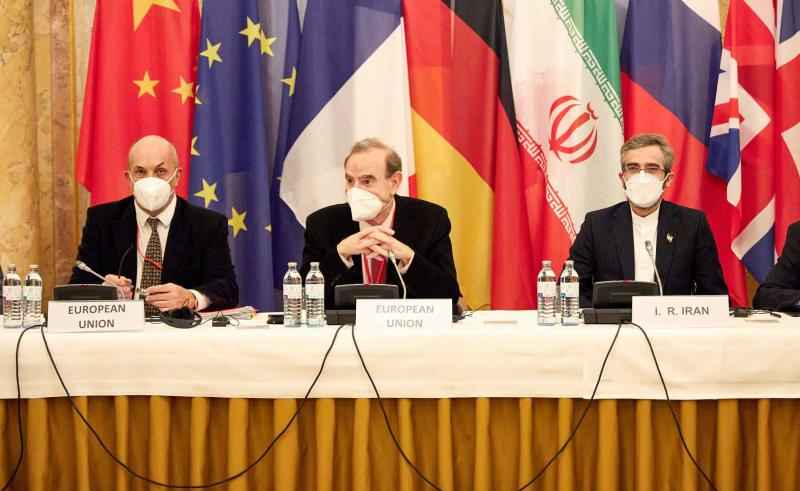
Diplomats in Vienna were again negotiating with the Iranian regime in an attempt to reach a return to the nuclear agreement yesterday. But time is running out.
Nuclear discussions with Iran resumed in Vienna on Thursday 4th of august after months of disruption. Initially, individual negotiators from Iran as well as Germany, France, Britain, Russia and China met for bilateral talks. The European Union, represented by its top diplomat Enrique Mora, is coordinating the talks.Russian negotiator Mikhail Ulyanov said he met with Mora on Thursday morning. They exchanged views on which steps need to be taken to restore the agreement. U.S. negotiator Robert Malley also traveled to Vienna. But it remains the case that the Iranians do not want to talk directly with the Americans, as the United States had pulled out of the 2015 nuclear deal (JCPOA) under former President Donald Trump and imposed sanctions. Since then, the Iranian side has also violated all benchmarks and restrictions on its nuclear program, acquiring uranium as much possible, pushing the limits. The current talks are about finding a level where all sides respect once again the terms of the JCPOA.
A largely negotiated draft of a renewed agreement is on the table. But talks have been stalled since March. The reason is the geopolitical environment since Russia’s invasion of Ukraine. Now a new round has been initiated – possibly the last chance to revive the 2015 agreement.
Washington’s expectations are limited
Malley said in advance that his expectations for success were limited. The U.S. special envoy tweeted that he welcomed the EU’s efforts and had the best of intentions – but whether that was the case on the Iranian side would soon become clear. Conversely, Teheran said that the Americans owed a debt of gratitude because they had withdrawn from the JCPOA.
A senior EU official expressed cautious optimism in Vienna on Thursday. Indeed it is not about how complex the technical issues are, it’s about the political will. It is said that all sides are in agreement with the new draft, even with the details modified from where they were in March – including the Iranians and the Americans. Various contentious issues that recently seemed to stand in the way of an agreement thus appear to be off the table – at least off the negotiating table in Vienna, where the JCPOA is at stake. According to this information, this also applies to the Iranian demand that the United States take the Revolutionary Guards off the terror list.
This had been discussed, among other things, with the participation of the EU as a transmitter of messages, at meetings in Oman and Qatar. The EU side went on to say that there were now three or four concrete points concerning the lifting of American sanctions. And three “nuclear issues”, meaning issues concerning Iran’s nuclear program. These are not only of concern to Teheran and Washington, but are also important to the other parties at the negotiating table, who are united in their interest in ensuring that Iran cannot obtain nuclear bombs.
These nuclear issues have also not yet been addressed in the text negotiated to date because they have only arisen as a result of Iran’s continued activity with ever more advanced centrifuges to ever higher levels of enrichment. From International Atomic Energy Agency data, it can be calculated that Iran should already have most of the needed material for a bomb through, the rest needed being just a very small portion of the end product.
The draft, in its most recent form, was presented by EU foreign affairs envoy Josep Borrell. He outlined its contents last week in the British Financial Times newspaper, saying the text was not perfect but contained all the compromises painstakingly won since 2021. No other comprehensive or effective option was tangible, he said. He was aware that the JCPOA continued to be politically polarizing in Washington as the midterm elections approached.
But strict limits on Iranian uranium enrichment and close IAEA oversight formed a cornerstone of global nonproliferation. Addressing Iran, Borrell expressed understanding for the mistrust given the negative experience of the past few years. His interview in the British press sharply criticizes Trump’s withdrawal from the agreement. But it seems that the new text for the JCPOA is better protected from being undermined unilaterally. The agreement would yield significant economic and financial dividends – rejection would threaten a dangerous nuclear crisis and increased isolation of Iran and its people.
Destabilization of the entire Middle East ?
China has no interest in destabilizing the region, in which it has a very active presence. However, this is precisely what is to be feared if Iran reaches for the nuclear bomb. Russia, too, has historically harbored a fundamental distrust of Iran, despite selective cooperation in Syria, for example. Another nuclear-armed neighbor is certainly not in Moscow’s interest.
On the other hand, Russian President Vladimir Putin undoubtedly has other priorities in the short term – Ukraine, of course, and the confrontation with the West. He would probably want to prevent the Europeans from trading with Iran after a return to the JCPOA and obtaining oil and gas from there to replace energy imports from Russia. Here, however, Iran in turn has other interests. It is important to call out the attempt by Moscow at the start of its Ukraine war to use the JCPOA as leverage to soften sanctions. Iran stumbled into that and that was interesting.
The fact that the conflict between Russia and the West is spilling over into the nuclear subject like this is very worrying. But above all there is a threat of destabilization throughout the Middle East.
Israel has made it clear many times that it would take action against a threatened nuclear arming of Iran, whether through sabotage as in recent years, or through direct military action. Iran would retaliate at least asymmetrically with its allied militias and terrorist groups. The other foreseeable consequence: that Saudi Arabia would aspire, at least latently, to be nuclear capable. It is, after all, already making all sorts of efforts in that direction. Thanks to Turkey’s NATO integration, there is less reason to fear that it will follow suit. But even as it is, the outlook is worrying. We see it in India and Pakistan, how dangerous it is when two nuclear powers are sitting on each other’s heels.
https://www.cfr.org/article/new-iran-deal-means-old-chaos
https://www.cfr.org/backgrounder/what-iran-nuclear-deal
https://www.eeas.europa.eu/eeas/now-time-save-iran-nuclear-deal_en
https://climate.envsci.rutgers.edu/pdf/IndiaPakistanBullAtomSci.pdf
By The European Institute for International Law and International Relations.














